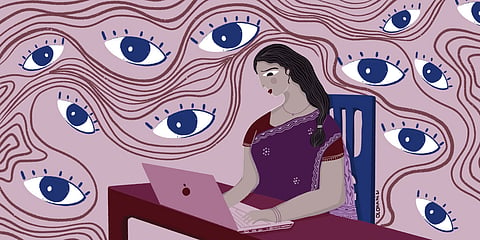Unpacking Digital Bangladesh
(This article is part of our special series 'Rethinking Bangladesh'. You can read the editorial note to the series here.)
On 12 December 2021, Bangladeshi media highlighted the country's digital policy achievements to commemorate 13 years to the day since Prime Minister Sheikh Hasina first called for a 'Digital Bangladesh'. The day was marked with quizzes, paintings and essay competitions, seminars and a prize-giving celebration, with Hasina as a key participant in the proceedings, virtually connecting to the main event at the Bangabandhu International Conference Centre (BICC). Hasina was a fitting chief guest since the extremely visible, highly marketed concept of Digital Bangladesh first materialised as a campaign promise made by the Awami League in the run up to the 2008 general elections. What this concept actually meant in practice, though, was undefined in their election manifesto – and remains somewhat blurry today.
On paper at least, Digital Bangladesh policies fall in line with the approaches encouraged under the global International and Communications Technologies for Development ('ICT4Development') agenda, which, broadly speaking, focuses on increasing internet access to allow for economic development, particularly in developing countries. According to a government website, Digital Bangladesh did not just promise efficient government service delivery, but also spoke of ensuring democracy and rights, transparency and accountability through the use of technology. Hasina has evoked the term in speeches slightly differently, saying her vision of Digital Bangladesh meant citizens would have lives free from 'crime and misrule' even while facing 21st-century challenges. As Delwar Hussain wrote in 2009, the slogan captured the imagination of many voters, especially first-time voters who made up approximately one-third of the electorate in 2008. The vision of digital Bangladesh had become synonymous with voters' hopes for a better democracy and more transparency – particularly so after the preceding years of political turmoil, including a state of emergency imposed in 2007, which led to delayed polls and opened the door to military control through a caretaker government.

